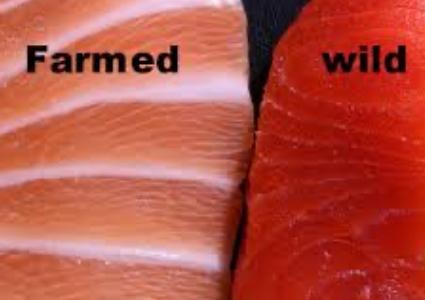Polling

Farmed salmon toxicity

Studies of salmon purchased from stores have found that 70% of Atlantic farmed salmon raised in Canada, the U.S. and Iceland were contaminated with unsafe levels of organic polychlorinated biphenyls (PCBs). Banned in 1976, PCBs are persistent, cancer-causing chemicals which also cause birth defects. Studies have shown that farmed salmon may be a consumer’s single largest source of toxic dietary pollutants. It may take decades for one's body to clear toxicants ingested from a single meal. Health advocates also say a clear link exists between PCBs and diabetes and obesity - diseases that have increased along with the consumption of farmed salmon over the past few decades. On average, farmed salmon are found to have more than 8 times the dioxin-like PCBs that are found in wild Pacific salmon. PCBs concentrate in the oils and fats contained in the fishmeal fed to farmed salmon. The EPA does not regulate PCB levels in farmed salmon as it does with wild fish.
The aquaculture industry says salmon is an excellent source of high-quality protein and omega-3 fatty acids which protects people against heart disease and other medical problems. They also claim FDA standards allow farmed salmon to be safely consumed more than once a week.
Critics call the FDA’s standards inadequate because they were formulated in 1984, before PCBs were known to be as harmful as they are now recognized to be. If the levels of PCBs found in farmed salmon were present in wild salmon, the EPA would restrict consumption of wild salmon to no more than one meal per month. More than 23 million Americans eat farmed salmon more than once a month.
Proposed Legislation: To require the EPA to uniformly regulate PCB levels in both farmed salmon and wild salmon.
Prospective Sponsor: Rep. Earl Blumenauer (OR)
The aquaculture industry says salmon is an excellent source of high-quality protein and omega-3 fatty acids which protects people against heart disease and other medical problems. They also claim FDA standards allow farmed salmon to be safely consumed more than once a week.
Critics call the FDA’s standards inadequate because they were formulated in 1984, before PCBs were known to be as harmful as they are now recognized to be. If the levels of PCBs found in farmed salmon were present in wild salmon, the EPA would restrict consumption of wild salmon to no more than one meal per month. More than 23 million Americans eat farmed salmon more than once a month.
Proposed Legislation: To require the EPA to uniformly regulate PCB levels in both farmed salmon and wild salmon.
Prospective Sponsor: Rep. Earl Blumenauer (OR)
Suggestion
Poll Opening Date
January 20, 2025
Poll Closing Date
January 26, 2025
